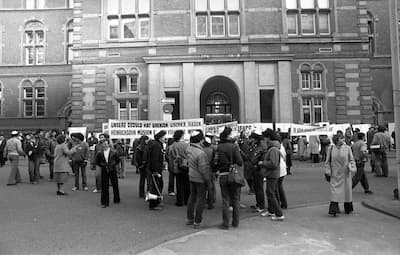The long drive for justice
In February 1972 the Klarsfelds confronted Kurt Lischka for the first time with his Nazi past. They went to his home in the Holweide district of Cologne, and filmed him on his daily way to work. The films were broadcast in various countries and provided clear factual evidence that, like many other Nazi criminals, Lischka was able to lead a free and unimpeded life.
In the following years the Klarsfelds – supported by the organization Fils et Filles des Déportés Juifs de France (‘Sons and Daughters of Jewish Deportees from France’) – continued to publicize the involvement and responsibility of those Nazi officials for the events of the Shoah and sought to bring them to trial. Their year-long efforts achieved their goal when the trial opened in October 1979.
